
by Natalia Rankine-Galloway (Morocco) | Jul 17, 2013 | Body Image, Cultural Differences, Culture, Expat Life, Feminism, International, Life Lesson, Living Abroad, Morocco, Religion, Saudi Arabia, Sexuality, Travel, Uncategorized, World Motherhood
 Recently, my boobs took a trip to Jordan. At least it seemed at the time that the rest of me was just along for the ride. Never had my cleavage gotten so much attention; never had it occupied my thoughts so completely.
Recently, my boobs took a trip to Jordan. At least it seemed at the time that the rest of me was just along for the ride. Never had my cleavage gotten so much attention; never had it occupied my thoughts so completely.
Having lived in Morocco for almost a year, I thought I knew how to strike the proper balance….somewhere between my usual, US appropriate signature style and a more modest décolletage that I felt was an appropriate concession to my host country’s social norms.
This balance was clearly off-kilter for Jordan. My ensembles were getting more attention from the male Jordanian population than a Britney Spears get up. Given that I have been a little sensitive about my dwindling cup size since giving up nursing my son, I was momentarily flattered….before being sincerely uncomfortable and confused.
I knew in theory that one country in the Middle East or North Africa would not necessarily adhere to the same standards of dress for women as the next, just as various areas or social classes within Morocco dressed worlds apart.
(more…)
Natalia was born a stone's throw from the Queen's racetrack in Ascot, UK and has been trying to get a ticket to the races and a fabulous hat to go with it ever since. She was born to a Peruvian mother and an Irish father who kept her on her toes, moving her to Spain, Ireland and back to the UK before settling her in New York for the length of middle and high school. She is still uncertain of what she did to deserve that.
She fled to Boston for college and then Washington, D.C. to marry her wonderful husband, who she met in her freshman year at college. As a military man, he was able to keep her in the migratory lifestyle to which she had become accustomed. Within 5 months of marriage, they were off to Japan where they stayed for a wonderful 2 and one half years before coming home to roost. Baby Xavier was born in New York in 2011 and has not slept since.
A joy and an inspiration, it was Xavier who moved Natalia to entrepreneurship and the launch of CultureBaby. She has loved forging her own path and is excited for the next step for her family and CultureBaby.
Natalia believes in the potential for peace that all children carry within them and the importance of raising them as global citizens. She loves language, history, art and culture as well as Vietnamese Pho, Argentinian Malbec, English winters, Spanish summers and Japanese department stores...and she still hopes one day to catch the number 9 race with Queen Liz.
You can find her personal blog, The Culture Mum Chronicles.
More Posts

by Mama B (Saudi Arabia) | Jul 3, 2013 | 2013, Politics, Religion, Saudi Arabia, Transportation, Travel, Uncategorized, Women's Rights, World Motherhood
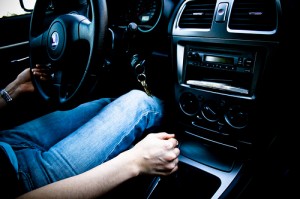 We always talk about “first world problems,” and, I, most of the time, complain about women not being able to drive in Saudi Arabia in the “first world problem” sense. “My driver is late!” or “It’s too hot in the car. I wish he’d switch on the AC before I get in” or “Why does it take so long for my driver to answer his phone!”
We always talk about “first world problems,” and, I, most of the time, complain about women not being able to drive in Saudi Arabia in the “first world problem” sense. “My driver is late!” or “It’s too hot in the car. I wish he’d switch on the AC before I get in” or “Why does it take so long for my driver to answer his phone!”
It’s easy for me to forget that for the majority of women in Saudi, it is very much a paralyzing issue. As I was leaving Saudi last week, I was in the airport lounge, and one of the women working there was having a private conversation on her mobile which got progressively louder. She kept saying, “Swear he’s ok! Why can’t I talk to him?”
After she hung up she said to me, “My son has had an accident!” I asked if he was ok. She told me she didn’t know and that someone at the scene had called her and told her about it, but they wouldn’t give him the phone and wouldn’t give her details. I asked why she didn’t just go to him, and she told me she couldn’t.
“Surely your supervisor wouldn’t have a problem with you leaving early to go there!” I said.
“I don’t have any way of getting there!”, she said. “My son is usually my driver. I don’t have brothers, and I’m divorced.”
And that’s the simple truth. Her son was on a street somewhere, in God knows what state ,and she was stuck at work. She eventually took a cab and declined the offer to use my car.
I always dread talking about women driving in Saudi because it’s been talked to death, and there’s nothing to discuss, really, since the fact that women should be allowed to drive is such an obvious one. It’s like discussing if women should be allowed to work… or walk even. Not driving means different things to different people. To me, it’s something I don’t think about on a day-to-day basis, unless we have a driver crisis. But even then, I rely on my mother’s, sister’s or brother’s driver to get me where I need to go, and I have never been stranded at home or elsewhere because of it. I forget that this is not the case for everyone.
Yes, some of my friends can’t do lunches on certain days because of the driver issues (lack of reliable ones or lack of ones all together), so when their husbands work they have to stay home. While many, many Saudi families have a driver working for them, not all of them do. And honestly, who cares if I can’t get to my family visit on time or to the shops before they close, when this mother couldn’t get to her son, who I pray was not badly injured in this accident.
And if, God forbid, he was badly injured, or worse, and he is her only “mahram” (male guardian), then she effectively has to put her life on hold till he gets better. And if it’s not a “getting better” situation, then she is stuck. Driving will be only one of her problems.
We do have taxis, which are generally decent, but many women don’t like to use them or the men in their lives don’t like them to. Which is all fine and dandy if these men are willing to be their wives’ personal chauffeurs, but if they refuse, then the women are stuck. But they do sometimes say “no,” and their wives, sisters, daughters comply. I have never really asked my husband how he would feel about me riding a taxi, since there never was a need to before, but I know that even if he didn’t want me to ride one, for what ever reason, he would never tell me I couldn’t.
Work has already begun on the metro system in Riyadh, and I am assuming that it will have a similar set up to Dubai, where there is a women’s tram. (Although in Dubai it is optional to go on that tram.) It will be interesting to see what we end up with, but is public transportation the answer to this problem? No.
Women being allowed to drive is a change that has to happen. It’s going to happen. I can guarantee that, but when? And the assumption that this is a governmental decision is totally wrong as the government is doing what the majority of the population wants.
When the subject of women driving is raised, it is always surprising how many people are against it. Women included. When they decided to introduce girls’ schools, the community also spoke out against it and were fearful and pessimistic. But the government just made the change, and the people got used to it. Now more than half the college graduates in Saudi are women! So, I hope we just rip the band-aid off.
And maybe the people will come around eventually and want this change, but how long do we want to wait? So many changes have come into our country, culture and environment that people are afraid to open up anymore, but there will be no progress without it.
Maybe I am wrong though. Maybe the views have changed, but the loudest voices are still of those who are against this. In Saudi the moderate voice is the one that talks at home among friends but doesn’t really rock the boat. The extreme views tend to be loud and very well organised.
A little side note to mention is there is no law against women driving. But there is a law against driving without a license, and women can’t get their licenses in Saudi.
It should just be done! Just as the 30 women were elected into the shours counsil by royal decree one morning, this change can happen too. It would, by no means, be mandatory, and whoever doesn’t want to drive, doesn’t have to. But for the women who are paralyzed, stuck and unable to get to their sons when they are hurt, a key to a car is not much to ask.
Do you agree with me that sometimes making unpopular decisions that will better your country is ok? Or is the government’s duty? Or do you think what the people want is more important?
This is an original post to World Moms Blog by Mama B from Saudi Arabia. She can be found writing at her blog, Ya Maamaa.
Photo credit to hhdoan who holds a Creative Commons Attribution license.

Mama B’s a young mother of four beautiful children who leave her speechless in both, good ways and bad. She has been married for 9 years and has lived in London twice in her life. The first time was before marriage (for 4 years) and then again after marriage and kid number 2 (for almost 2 years). She is settled now in Riyadh, Saudi Arabia (or as settled as one can be while renovating a house).
Mama B loves writing and has been doing it since she could pick up a crayon. Then, for reasons beyond her comprehension, she did not study to become a writer, but instead took graphic design courses. Mama B writes about the challenges of raising children in this world, as it is, who are happy, confident, self reliant and productive without driving them (or herself) insane in the process.
Mama B also sheds some light on the life of Saudi, Muslim children but does not claim to be the voice of all mothers or children in Saudi. Just her little "tribe." She has a huge, beautiful, loving family of brothers and sisters that make her feel like she wants to give her kids a huge, loving family of brothers and sisters, but then is snapped out of it by one of her three monkeys screaming “Ya Maamaa” (Ya being the arabic word for ‘hey’). You can find Mama B writing at her blog, Ya Maamaa . She's also on Twitter @YaMaamaa.
More Posts

by Mannahattamamma (UAE) | May 22, 2013 | Body Image, Cultural Differences, Feminism, Human Rights, Religion, SAHM, Sex, Tunisia, UAE, Womanhood, Women's Rights, World Events, World Voice
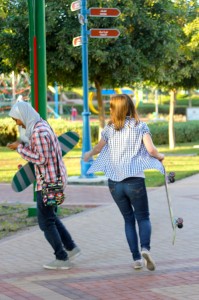 I used to have a college professor—of women’s studies, of course—who would occasionally start class when we were particularly chatty and inattentive by saying, loudly, “SEX!” Our heads would whip around to stare at her and the room would be silent.
I used to have a college professor—of women’s studies, of course—who would occasionally start class when we were particularly chatty and inattentive by saying, loudly, “SEX!” Our heads would whip around to stare at her and the room would be silent.
The professor would chuckle and then start the lesson, which almost never had anything to do with sex—or at least not sex in an interesting way. Her way of talking about sex was dry and academic, having to do with words like “hegemony” or “heteronormative.”
I thought about that professor a few weeks ago when I read about “International Topless Jihad Day,” sponsored by FEMEN in support of Amina Tyler, who had sparked a global controversy by posting a topless pictures of herself on Facebook with “my body belongs to me and is not the source of anyone’s honor,” scrawled on her naked chest in Arabic. Tyler’s life—and the lives of her family—were threatened after the pictures were posted; she has since left Tunisia, where she lived.
The topless jihadists claimed that their actions showed solidarity with Amina and sent a message to the world that women’s bodies belong to no one but themselves. And yet it seems a bit like my professor yelling SEX! FEMEN is yelling BOOBS–and the topless jihad did, it’s true, get a lot of press coverage. The coverage drew attention to Amina’s plight but also gave respected media outlets a chance to run pictures of boobs and more boobs: Huffington Post ran a whole slideshow of revolutionary boobs. (more…)
After twenty-plus years in Manhattan, Deborah Quinn and her family moved to Abu Dhabi (in the United Arab Emirates), where she spends a great deal of time driving her sons back and forth to soccer practice. She writes about travel, politics, feminism, education, and the absurdities of living in a place where temperatures regularly go above 110F.
Deborah can also be found on her blog, Mannahattamamma.
More Posts
Follow Me:


by Tara Bergman (USA) | Apr 1, 2013 | Motherhood, Religion, Tara B., USA, World Motherhood
 Back in November of 2011, I wrote a post here on WMB titled “How We Pray”. This addressed how my husband and I foster spirituality in our home without following any one specific religion. I’m in the process of reflection on these efforts, so I decided to write an update.
Back in November of 2011, I wrote a post here on WMB titled “How We Pray”. This addressed how my husband and I foster spirituality in our home without following any one specific religion. I’m in the process of reflection on these efforts, so I decided to write an update.
We continue to say our daily intentions as mentioned in the previous post, but I have added to our morning routine a spiritual thought of the day pulled straight from Deepak Chopra’s “Seven Spiritual Laws For Parents.” Pictured below is a well-worn paper taped to our kitchen wall. (more…)
Tara is a native Pennsylvanian who moved to the Seattle area in 1998 (sight unseen) with her husband to start their grand life adventure together. Despite the difficult fact that their family is a plane ride away, the couple fell in love with the Pacific Northwest and have put down roots. They have 2 super charged little boys and recently moved out of the Seattle suburbs further east into the country, trading in a Starbucks on every corner for coyotes in the backyard. Tara loves the outdoors (hiking, biking, camping). And, when her family isn't out in nature, they are hunkered down at home with friends, sharing a meal, playing games, and generally having fun. She loves being a stay-at-home mom and sharing her experiences on World Moms Network!
More Posts
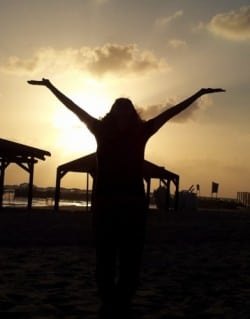
by Susie Newday (Israel) | Mar 25, 2013 | Culture, Eye on Culture, Family, Holiday, Israel, Religion, Susie Newday
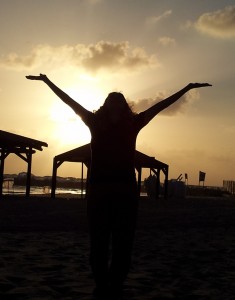 Tonight is the first night of Passover, a Jewish holiday that commemorates the story of the Exodus when the Jews were freed from prolonged slavery in ancient Egypt.
Tonight is the first night of Passover, a Jewish holiday that commemorates the story of the Exodus when the Jews were freed from prolonged slavery in ancient Egypt.
On Passover (also called Pesach) we refrain from eating “chametz”. Chametz (leavening) is anything made from five types of grain and left to rise more than 18 minutes. So basically, the prelude to this holiday is crazy spring cleaning, getting rid of any chametz in the house before Passover starts, and not bringing anything not kosher for Passover into the house until after Passover. It also involves koshering your kitchen and making sure not to mix the “chametz” with the Passover stuff.
As you can imagine, the logistics are enough to cause anyone an ulcer. At least they are if you are not living alone, continue to work and have a family to feed and take care of while trying to get everything else done. Say the word Pesach to me and there is an immediate visceral reaction of stress.
The question I have been asking myself for years is why do we all tend to make things so much harder on ourselves than it really has to be. Passover is the holiday that represents freedom yet way too many people feel like slaves in the weeks before Passover. A self imposed slavery. (more…)
Susie Newday is a happily-married American-born Israeli mother of five. She is an oncology nurse, blogger and avid amateur photographer.
Most importantly, Susie is a happily married mother of five amazing kids from age 8-24 and soon to be a mother in law. (Which also makes her a chef, maid, tutor, chauffeur, launderer...) Susie's blog, New Day, New Lesson, is her attempt to help others and herself view the lessons life hands all of us in a positive light. She will also be the first to admit that blogging is great free therapy as well. Susie's hope for the world? Increasing kindness, tolerance and love.
You can also follow her Facebook page New Day, New Lesson where she posts her unique photos with quotes as well as gift ideas.
More Posts - Website
Follow Me:





by Ms. V. (South Korea) | Feb 26, 2013 | Inspirational, Religion, South Korea
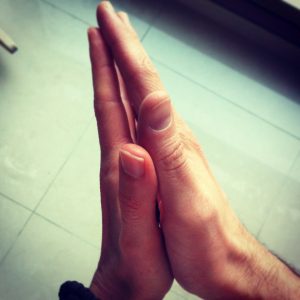
“Connecting.”
We are in the midst of the Christian Lenten season. About 20% of Koreans are either Catholic or Protestant, so even in this predominantly Buddhist country, I am seeing signs of the Christian faithful observing the 40 days leading up to Easter.
The observation of Lent was not in my faith tradition growing up, and I do not identify as Christian. That said, I decided this year, for the very first time, to observe Lent in my own way.
I love the idea of setting aside a specific amount of time to step back, take stock, and reflect. As I began my research into the origins and practices of Lent I kept coming across something I’d never known; this idea that Lent is a form of justice to God, self, and others and that it is a time to call things what they are.
Calling things what they are. (more…)
Ms. V returned from a 3-year stint in Seoul, South Korea and is now living in the US in the beautiful Pacific Northwest with her partner, their two kids, three ferocious felines, and a dog named Avon Barksdale. She grew up all over the US, mostly along the east coast, but lived in New York City longer than anywhere else, so considers NYC “home.” Her love of travel has taken her all over the world and to all but four of the 50 states.
Ms. V is contemplative and sacred activist, exploring the intersection of yoga, new monasticism, feminism and social change. She is the co-director and co-founder of Samdhana-Karana Yoga: A Healing Arts Center, a non-profit yoga studio and the spiritual director for Hab Community. While not marveling at her beautiful children, she enjoys reading, cooking, and has dreams of one day sleeping again.
More Posts
Follow Me:


 Recently, my boobs took a trip to Jordan. At least it seemed at the time that the rest of me was just along for the ride. Never had my cleavage gotten so much attention; never had it occupied my thoughts so completely.
Recently, my boobs took a trip to Jordan. At least it seemed at the time that the rest of me was just along for the ride. Never had my cleavage gotten so much attention; never had it occupied my thoughts so completely.






 Back in November of 2011, I wrote a post here on WMB titled “
Back in November of 2011, I wrote a post here on WMB titled “









